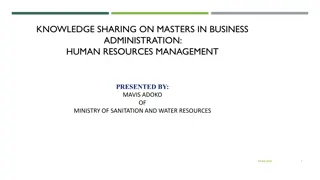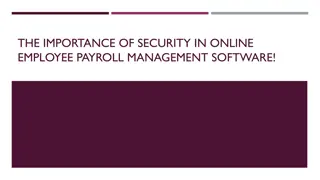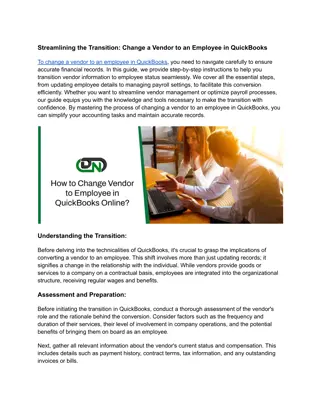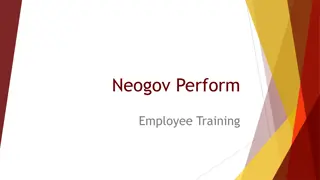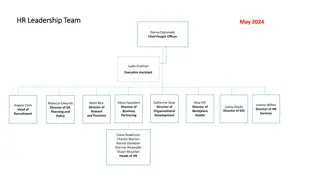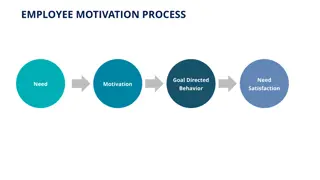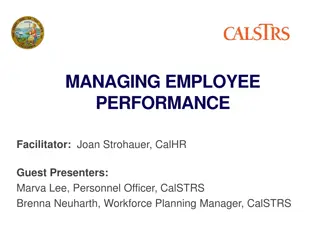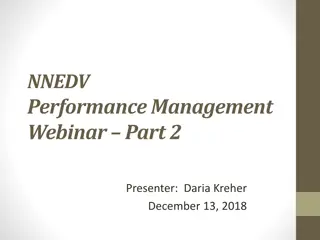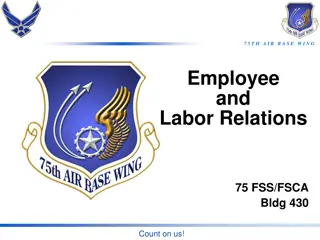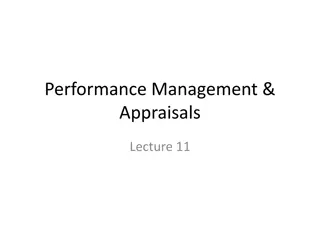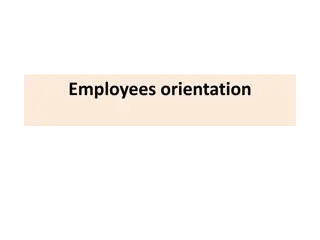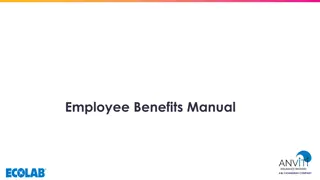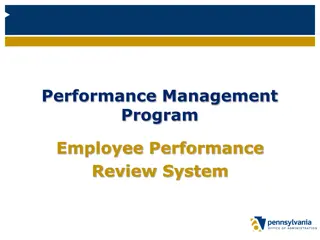Evaluating Employee Performance in Challenging Times
In times of adversity, such as the challenges faced in 2020, it is crucial to evaluate employee performance with empathy and understanding. Recognize and appreciate the efforts of dedicated employees who continue to work hard amidst uncertainty. Use compassion, diverse data collection methods, and feedback as focal points for evaluation. Reflect on the purpose of the assessment, considering both short-term and long-term goals. Be mindful of the unique circumstances each team member may be facing and adjust expectations accordingly. It's essential to support and uplift employees during difficult times to maintain a positive work environment and foster growth.
Download Presentation

Please find below an Image/Link to download the presentation.
The content on the website is provided AS IS for your information and personal use only. It may not be sold, licensed, or shared on other websites without obtaining consent from the author.If you encounter any issues during the download, it is possible that the publisher has removed the file from their server.
You are allowed to download the files provided on this website for personal or commercial use, subject to the condition that they are used lawfully. All files are the property of their respective owners.
The content on the website is provided AS IS for your information and personal use only. It may not be sold, licensed, or shared on other websites without obtaining consent from the author.
E N D
Presentation Transcript
Evaluating Performance During Difficult Times Dr. Chandra Alston, Associate Vice Chancellor, Human Resources
2020 was a Tough Year! 2020 was a Tough Year! Abrupt, Unscheduled Closures Forced Telecommuting Death, Sickness, and Fear Dynamic Situations and Rapid Reponses Isolation, Depression, and Mental Health Challenges
Make sure you seize this performance evaluation opportunity to recognize and show appreciation for employees who are working hard, engaged, committed, and offering their support to others.
5 Ideas for Evaluating Performance 5 Ideas for Evaluating Performance During Difficult Times During Difficult Times 1. Reflect on Your Purpose 2. Be Compassionate: Ease Off the Productivity Guilt 3. Gather Different Kinds of Data 4. Make Feedback the Focus 5. Set the Right Tone
Evaluating Performance During Difficult Times Idea #1 Idea #1 - - Reflect on Your Purpose Reflect on Your Purpose Why are you conducting this review? Strengthen our culture and reinforce our values. Think about what you are evaluating. - Output or productivity prior to the pandemic or how well are they doing now? - Goals set pre-pandemic may no longer be applicable; concentrate on growth and learning. - Acknowledge teamwork and collaboration. They are essential in a crisis. - Integrate short-term and long-term departmental goals into your employee s evaluation. Tend to your flock! What you do and say now will be remembered!!! You are still trying to help your employees become as strong as possible!
Evaluating Performance During Difficult Times Idea #2 Idea #2 Be Compassionate Be Compassionate Fully acknowledge the vastly different circumstances of team members. Be a little more flexible, have a little more heart, and be a little more lenient. Think about what they are dealing with. - Juggling calls/emails while entertaining their toddler. - Helping their tweens with algebra. - Overseeing projects while caring for elderly family members. - Trying to work while struggling with feelings of isolation. Give people a little more latitude! We don t know exactly how rough it is for employees, so we can NOT only look at productivity while ignoring their home situations.
Evaluating Performance During Difficult Times Idea #3 Idea #3 Gather Different Kinds of Data Gather Different Kinds of Data You don t have as much data as you used to. Because you have gone remote, you don t have as much information as you used to. Be conscious of your biases. The risk is that your old biases, positive or negative, are going to be amplified. Your star performers are sure to be doing great while your stragglers are dropping the ball. To combat the issue, you need to be conscious of those biases and look for other sources of data. Find ways to get data useful for the evaluation process. - Allow employees to self evaluate or use the self assessment provided by HR. - Canvass peers and customers for their thoughts. - Ask others: How is this employee proactively contributing? How are they connecting with clients and colleagues? Who are they helping?
Evaluating Performance During Difficult Times Idea #4 Idea #4 Make Feedback the Focus Make Feedback the Focus Performance reviews should be a two-way conversation. Listen for the issues employees are facing regarding how successfully they can do their work. Focus on developing and rewarding employees, but also making a case if an employee needs to be dismissed. Don t duplicate pre-pandemic evaluations. The issue with giving everyone the same rating is that it may demotivate high performers and set the tone with underperforming that their performance is satisfactory. Adjust goals and objectives. - Agree on which things need to be accomplished. - What is feasible given the circumstances? - Which areas show success is possible?
Evaluating Performance During Difficult Times Idea #4 Idea #4 Make Feedback the Focus Make Feedback the Focus (continued) Tread lightly with poor performers. - Now is not the time to beat them up. - Make a conscious decision which battles to fight now. - If someone on the team is not delivering, find out why by asking what is going on in their lives. For employees dealing with extremely challenging situations, suggest support through our Employee Assistance Program (EAP) 24/7/365 at 855.437.3486. Lavish praise on those deserving employees. Make sure you seize this opportunity to recognize and show appreciation for employee who are working hard, engaged, committed and offering their support to others. Reach out for support Our UTHSC Employee Relations team is here to help you navigate performance issues. Please contact our team at 901.448.5600 or email hr@uthsc.edu for assistance.
Evaluating Performance During Difficult Times Idea #5 Idea #5 Set the Right Tone Set the Right Tone For these types of situations, VIDEO is important. Use video if you can t be in person, it s more personal and humane. Be open and warm. Be prepared with data and thoughtful feedback. Pay close attention to body language both yours and your employees. Listen carefully and encourage back and forth communication.
Five Keys to Evaluating Performance During Five Keys to Evaluating Performance During Difficult Times Difficult Times Reflect on Your Purpose Be Compassionate: Ease Off the Productivity Guilt Gather Different Kinds of Data Make Feedback the Focus Set the Right Tone
Principles to Remember Principles to Remember DON T: - Be hard-hearted toward your poor performers. Give them a time-bound grace period to get used to working remotely and to turn things around. - Let your old biases creep in. Seek out alternative data. Ask colleagues and reports for information on how well other employees are communicating, collaborating, and helping. - Revert to business as usual instead, think about how to do performance reviews better. In this environment, semi-annual or quarterly check-ins may be optimal.
Principles to Remember Principles to Remember DO: - Approach your evaluations with more flexibility, leniency, empathy, and compassion. - Recognize and show appreciation for employees who are engaged and working hard. It s critical for their morale and for your organization s ability to retain them. - Use video (Zoom or MS Teams) for this conversation. It is more personal and humane. - Use the key elements guide to assist with your evaluations. - Provide additional explanation/documentation if you rate an employee the lowest rating (does not meet expectations) or the highest rating (consistently exceeds expectations).
Performance Review Summary Form: Key Elements
Key Elements Key Elements Accomplishments Service and Relationships Accountability and Dependability Equity, Diversity, and Inclusion Decision Making and Problem Solving
Session Handout Session Handout Link to this session and the handout is available at: www.uthsc.edu/hr/compensation/ performance-evaluations.php
Need More Support? Need More Support? Assistance with difficult situations: Contact our Employee Relations team to get support and guidance for challenging situations by calling 901.448.5600 or emailing hr@uthsc.edu.




